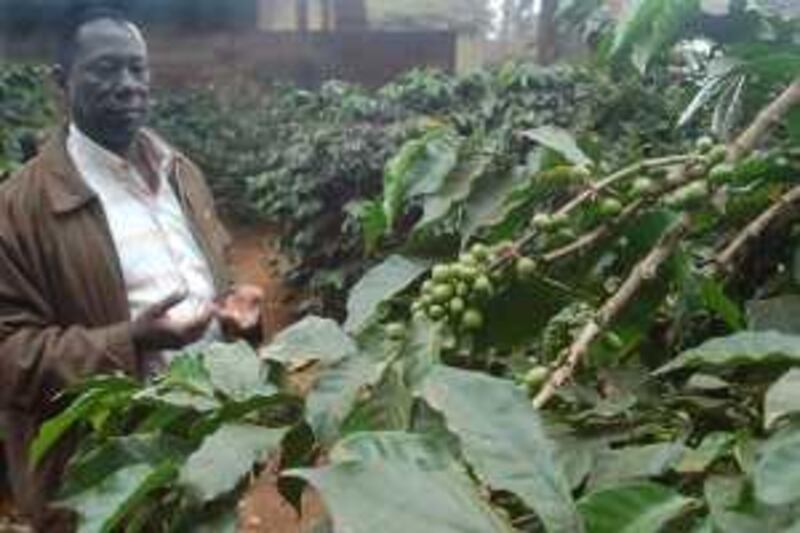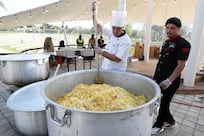KIAMBU, Kenya // The origin of coffee is shrouded in myth. According to legend, a ninth century Ethiopian goatherd named Kaldi observed that his goats became energised after nibbling on some wild berries. He took the fruits to a holy man who disapproved of the berries as a drug and threw them into the fire, where they released a pleasant aroma. The roasted coffee beans were ground and boiled in hot water, creating the world's first cup of coffee. A thousand years later, coffee is the second most traded commodity after oil. Coffee connoisseurs from Asuncion to Zagreb shell out billions of dollars each year to sip fancy cappuccinos, lattes and caramel macchiatos. But the farmers who harvest the beans that go into those lattes hardly see any of that big money. The fair trade certification system started several years ago lets consumers identify coffee that was grown in an environmentally and socially conscious way. Fair trade is supposed to ensure that farmers receive the maximum profit for their crop. Here in the hilly highlands of central Kenya, where rows of dark green Arabica coffee trees line the red earth roads, small-scale farmers are earning more for their fair trade certified produce, but they still live in poverty. Kenya's coffee industry brings in about US$200 million (Dh734m) per year, making it the country's third largest export, after flowers and tea. According to the Kenya Coffee Board, 60 per cent of the coffee is produced by small-scale farmers who have less than two acres of coffee plants. The industry employs about a million workers throughout the country. Almost all of the 700,000 small-scale coffee farmers in Kenya are organised into co-operatives of about 2,000 farmers each. These co-ops help farmers get a better price for their crop either at auction or through direct sales to buyers in Europe and North America. But, according to a Kenyan government official involved in regulating the coffee industry, much of the profits go to middlemen, millers, marketers and the co-op management, leaving the small-scale farmers with a fraction of the value of their coffee. "The co-op system is failing the small-scale farmers," said the official, who spoke anonymously because he was not authorised to speak to the media. In the co-ops that are certified as fair trade, farmers receive a minimum of five US cents per kilogram cents on top of the going price for their coffee because of the fair trade status. Since the Ndumberi Coffee Farmers Co-operative in Kiambu became fair trade certified last year, payments to the farmers have almost doubled. "Fair trade insists on better payments to the farmers," said Raymond Gitau, the chairman of the co-op. "Due to the certification, our farmers have gained a lot." The co-op recently partnered with Mars Drinks, a division of Mars Inc, and provides coffee for the company's Flavia line of beverages. While Mars Inc buys some of its coffee from fair trade farmers, the company has come under fire for making chocolate from cocoa beans picked by unpaid child labourers from the Ivory Coast. Mars Inc and other large chocolate manufacturers have been sued in the US for supporting alleged illegal child labour practices and activists have called for a boycott of their products. Even with the lucrative coffee deal and fair trade status, small-scale coffee farmers struggle to make a living. Josphat Kamau, 76, has been growing coffee here for 45 years. Mr Kamau, a member of the fair trade certified co-op, has 600 coffee trees on little more than one acre. Last year, Mr Kamau said he made $940 from his crop, which is about $2.50 per day or about the cost of a small latte at Starbucks. He said he was aware of this disparity. "We don't get good money for our efforts," he said. "We hear how coffee has brought a lot of money to Europe and America, but we have gotten very little." After the coffee fruits are picked, they are sent to mills, like the facility at Mbumi Coffee Estate, a large coffee plantation with 150 acres of trees. Once the skin has been removed, the beans are spread out to dry in the sun. Most of the coffee Kenya exports is green. It is roasted and repackaged in Europe and sold at double the cost. There are only a few coffee-roasting facilities in Kenya, and a quirky rule from colonial times prevents roasting from taking place where coffee is grown and milled. When the British introduced coffee plants in Kenya in the 1920s, the colonialists wanted it to be strictly a cash crop. They discouraged locals from drinking coffee and pushed tea instead. As a result, most Kenyans drink tea, although a few bistros selling local coffee have started appearing around Nairobi, the capital. "Our colonial masters made tea fashionable," said Isaac Gichia, the general manager of the Mbumi coffee plantation. "Rules left over from the colonial days say you can't harvest and roast your own coffee. When you roast coffee, you almost double the value." The roasting rule was instituted by the British colonial authorities but Kenyan coffee industry officials have not bothered to change it, and thus the rule is left over from colonial days. Mr Gichia, who has been working on this family-owned estate since 1993, is passionate about Kenya's coffee industry. He encourages small-scale farmers to become better businessmen so that they can start profiting from coffee. "We need to push our farmers to understand what they're doing," he said. "They need to know coffee as an economic powerhouse for the country and for themselves." mbrown@thenational.ae
Fair trade fails Kenya's small coffee growers
A government official says middlemen get the biggest returns despite a system that is supposed to maximum profits for farmers.

Editor's Picks
More from the national




